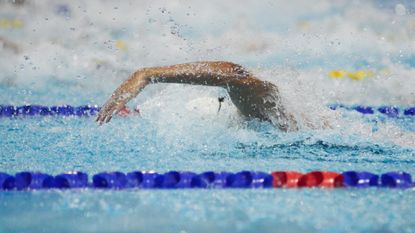Swimming’s governing body bans trans athletes from elite women’s races
Fina may introduce an ‘open’ category to allow trans swimmers to compete at highest level

Swimming’s world governing body Fina has voted to stop transgender women from competing in women’s elite races if they have gone through any part of male puberty.
The new policy was adopted when 71% of Fina’s 152 national federations voted in favour at an “extraordinary” general congress at the ongoing World Championships in Budapest, reported BBC Sport.
The new rules, set out in a 34-page policy document, mean that male-to-female transgender athletes will only be able to compete in women’s categories “provided they have not experienced any part of male puberty beyond Tanner Stage 2 [which marks the start of physical development], or before age 12, whichever is later”.
Subscribe to The Week
Escape your echo chamber. Get the facts behind the news, plus analysis from multiple perspectives.

Sign up for The Week's Free Newsletters
From our morning news briefing to a weekly Good News Newsletter, get the best of The Week delivered directly to your inbox.
From our morning news briefing to a weekly Good News Newsletter, get the best of The Week delivered directly to your inbox.
It follows a report from a Fina scientific panel “that found trans women retained a significant advantage over cisgender female swimmers even after reducing their testosterone levels through medication”, reported The Guardian. The swimming body has promised to create a working group to establish an “open” category for trans women in some events as part of its new policy.
‘Seismic decision’
The new policy is a “seismic decision” that sets swimming apart from “most Olympic sports”, said The Guardian. Other sports use testosterone limits as a basis for allowing trans women to compete in women’s events, said the paper, “a stance that has promoted inclusion but has been criticised on unfairness grounds”.
Swimming is now only the second Olympic governing body to introduce a ban on “scientific grounds” and follows a similar decision made by World Rugby in 2020. It comes after a period of “widespread unease” in the sport after Lia Thomas, a US college swimmer who had formerly competed in the men’s category to moderate success, won an NCAA national college title this year after swimming in the women’s competition.
‘Complex balance’
The “heart” of the debate over whether transgender women athletes should compete in women’s sports “involves the complex balance of inclusion, sporting fairness and safety” and is “essentially” over whether trans women can compete in women’s categories “without giving them an unfair advantage or presenting a threat of injury to competitors”, said BBC Sport.
Trans women already have to adhere to several rules to compete in specific sports “including in many cases lowering their testosterone levels to a certain amount, for a set period of time, before competing”, the broadcaster explained.
But there have been concerns over whether athletes who have gone through male puberty “retain an advantage from going through male puberty that is not addressed by lowering testosterone”. Sports scientist Ross Tucker, who was a consultant on World Rugby’s transgender policy, said in The Telegraph: “Biological differences between males and females largely persist, even after a period of testosterone reduction, and this biology has significant implications for performance.”
‘Sport by definition is exclusionary’
Former British Olympic swimmer Sharron Davies, who has argued against transgender participation in women’s elite swimming, told BBC Sport she was “really proud of Fina”.
She said: “Sport by definition is exclusionary – we don’t have 15-year-old boys racing in the under-12s, we don’t have heavyweight boxers in with the bantamweights, the whole reason we have lots of different classes in the Paralympics is so that we can create fair opportunities for everybody.”
Davies said “the only people who were going to be losing out were females – they were losing their right to fair sport”.
‘Harmful, unscientific’
But LGBTQ advocacy groups have criticised the decision. Athlete Ally, which organised a letter of support for Thomas in February, called the new policy “discriminatory, harmful, unscientific” and not in line with guidelines set by the International Olympic Committee (IOC).
Current IOC guidelines state that there should be no presumption that trans women have an automatic advantage over natal women, and leaves individual sports to decide their own eligibility criteria for athletes.
Joanna Harper, a transgender sports scientist who has advised the IOC, told Newsnight in May that “the question isn’t, do trans women have advantages, but can trans women and cis-gender women compete against one another in meaningful competition?” She said that the answer “isn’t definitive in all sports” and that the scientific research in this area was “in its infancy”.
‘Manufactured crisis’
Fallon Fox, a transgender former mixed martial artist, called Fina’s decision a “knee-jerk reaction” to a “manufactured crisis in swimming”, and argued that there was little proof that transgender athletes threaten to dominate women’s sports.
She told the BBC Radio 4’s Today programme that if you “field test the hypothesis that transgender women have an unfair advantage” it becomes clear that “transgender women barely register as winning competitors”. Fox said: “People can only point to one national champion whose times are not good enough to allow her into the Olympics.”
Create an account with the same email registered to your subscription to unlock access.
Sign up for Today's Best Articles in your inbox
A free daily email with the biggest news stories of the day – and the best features from TheWeek.com
-
 Today's political cartoons - April 13, 2024
Today's political cartoons - April 13, 2024Cartoons Saturday's cartoons - moderate MAGA, automotive politics, and more
By The Week US Published
-
 5 Grand Canyon-size cartoons on the Arizona abortion ruling
5 Grand Canyon-size cartoons on the Arizona abortion rulingCartoons Artists take on a chasm in reproductive freedom, the dangers of an abortion ban, and more
By The Week US Published
-
 Crossword: April 13, 2024
Crossword: April 13, 2024The Week's daily crossword
By The Week Staff Published
-
 Is a new English football regulator an own goal for the game?
Is a new English football regulator an own goal for the game?Talking Point PM hails 'historic moment for football fans' but West Ham owner warns it could 'ruin' Premier League
By The Week UK Published
-
 English football and the etiquette of leaving the stadium early
English football and the etiquette of leaving the stadium earlyTalking Point The belief that 'true fans stay to the end' does not always apply
By The Week UK Published
-
 The Parkrun records row
The Parkrun records rowWhy everyone's talking about Weekly fun run deletes historic comparative data from website amid row over trans participants
By Harriet Marsden, The Week UK Last updated
-
 The 'Enhanced Games': a dangerous dosage?
The 'Enhanced Games': a dangerous dosage?Talking Point A drug-fuelled Olympic-style competition is in the works but critics argue the risks are too high
By Sorcha Bradley, The Week UK Published
-
 College football has a major controversy. Will Congress get involved?
College football has a major controversy. Will Congress get involved?Talking Point Why Florida State was left out of the College Football Playoff
By Joel Mathis, The Week US Published
-
 Saudi Arabia's 2034 World Cup: glitz, glamour and 'grimly inevitable'
Saudi Arabia's 2034 World Cup: glitz, glamour and 'grimly inevitable'Talking Point Critics claim country is guilty of sportswashing as it stands unopposed to host tournament
By Julia O'Driscoll, The Week UK Published
-
 Luis Rubiales and Spanish football’s MeToo moment
Luis Rubiales and Spanish football’s MeToo momentTalking Point Furore over Spanish FA president’s ‘non-consensual’ kiss overshadows World Cup triumph
By Harriet Marsden Published
-
 Chess and trans rights: another pawn in the culture war?
Chess and trans rights: another pawn in the culture war?Talking Point Several national chess federations have announced they will not be adhering to the international governing body’s new restrictions on trans players
By Arion McNicoll Published